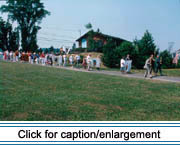|
 As understood by Maine Acadians, the characteristic features of Maine
Acadian cultural identity are rooted in the shared values, ideas, and
practices passed on from one generation to the next. Maine Acadians have
historically used the French language to transmit cultural knowledge,
particularly oral traditions. Today, French is learned as a first or second
language throughout the Valley. "Valley French" is principally spoken
rather than written. Public discussions concerning the role of language
in contemporary Maine Acadian identity are invariably lively. Some Maine
Acadians argue that the preservation of the French language in the St.
John Valley must be the cornerstone of all activities undertaken in the
field of Maine Acadian culture, because retention of one's language is
essential to the desire to preserve one's cultural identity. This view
has been expressed at meetings, focus groups conducted for this report,
and in other forums. Jim Lavertu presented the case to the Maine Acadian
Culture Preservation Commission:
As understood by Maine Acadians, the characteristic features of Maine
Acadian cultural identity are rooted in the shared values, ideas, and
practices passed on from one generation to the next. Maine Acadians have
historically used the French language to transmit cultural knowledge,
particularly oral traditions. Today, French is learned as a first or second
language throughout the Valley. "Valley French" is principally spoken
rather than written. Public discussions concerning the role of language
in contemporary Maine Acadian identity are invariably lively. Some Maine
Acadians argue that the preservation of the French language in the St.
John Valley must be the cornerstone of all activities undertaken in the
field of Maine Acadian culture, because retention of one's language is
essential to the desire to preserve one's cultural identity. This view
has been expressed at meetings, focus groups conducted for this report,
and in other forums. Jim Lavertu presented the case to the Maine Acadian
Culture Preservation Commission:
What is distinctive about the Acadians here in Northern Maine? I'll
tell you right away, it's the French language. (Jan. 1993) . . . in
another generation I think French will be lost; and if we lose French
language, I think a lot of our culture will be lost. We'll still have
a culture, a museum to go to, but the living culture will be dead. .
. . (Sept. 1993)
Cleo Ouellette, speaking for other Maine Acadians, expresses a contrasting
perspective on the core of Maine Acadian identity (focus group 1993):
It's not just the language. It's the way we do things. For
example, when somebody comes to your house, you'll offer him food. That's
one of the ways in which we've been raised to greet people. [emphasis
added]
|
 |
 |
In agreement, a second discussion participant added, "In French or English,
we still offer
them food."
Family, religion, and attachment to the land and waterways of the Upper
St. John Valley are other key identifiers of Maine Acadian identity. The
importance of these elements is conveyed in a wide range of public contexts
through a variety of means. Storytelling is a common means by which heritage
and lessons about appropriate behavior are communicated, in both French
and English. The Maine Acadian repertoire includes fictional, quasi-historical,
historical, and contemporary characters and events that may be recounted
in family settings and at certain civic events. Just as they are incorporated
into this chapter, stories of all kinds, including personal experiences,
are used to underscore important points.
I remember my father telling us that honesty, a man's name, if
he lost his name he might as well die.  And
he told us as a young man during the Depression trying to get a job,
he got a job at the highway department. He needed a shovel and he went
to the store and asked the man. He said, "I don't have any money, but
I need this shovel because I'm starting work tomorrow. So would you
give me credit?" And the man said, "No, I don't extend credit. But you're
Joseph Paradis' son, right? I know your father. He's an honest man.
I'll give you the shovel and when you get your paycheck and you feel
like paying me, pay me. And if you don't feel like paying me, keep the
shovel." There was trust there. Because he was so-and-so's son, he could
trust. Of course, the first paycheck that come around, my father was
over there with the $1.50 for that shovel. (Cleo Ouellette, focus group
1993) And
he told us as a young man during the Depression trying to get a job,
he got a job at the highway department. He needed a shovel and he went
to the store and asked the man. He said, "I don't have any money, but
I need this shovel because I'm starting work tomorrow. So would you
give me credit?" And the man said, "No, I don't extend credit. But you're
Joseph Paradis' son, right? I know your father. He's an honest man.
I'll give you the shovel and when you get your paycheck and you feel
like paying me, pay me. And if you don't feel like paying me, keep the
shovel." There was trust there. Because he was so-and-so's son, he could
trust. Of course, the first paycheck that come around, my father was
over there with the $1.50 for that shovel. (Cleo Ouellette, focus group
1993)
While extolling the virtues of honesty and hard work, this story also
illustrates the value Maine Acadians attach to family names and histories.
A relatively small number of family names are shared by a great many Maine
Acadians and continue to predominate in the communities of the Upper St.
John Valley. (Surnames with the most listings within the Valley telephone
exchanges are: Albert, Cyr, Bouchard, Daigle, Martin, Michaud, Ouellette,
Pelletier, and Thibodeau.) Interest in genealogy is widespread, and the
practice of producing commemorative volumes featuring old photographs,
documents, and oral history is popular among families, as well as community
institutions.
 "Home
and family is everything," say many Maine Acadians. According to this
view, the family remains the primary source of personal and cultural identity.
Despite erosion of the traditional gender-based division of labor in which
women are responsible for the domestic sphere (including socialization
and identity formation) and men dominate in external activities (such
as wage labor, trade, and politics), the effects of the mother's cultural
affiliation and role in imparting cultural identity are still considered
substantial. Concerned about instilling Maine Acadian identity in her
two young sons, Cathy Corey has been actively studying her culture for
the last several years (focus group 1993): "Home
and family is everything," say many Maine Acadians. According to this
view, the family remains the primary source of personal and cultural identity.
Despite erosion of the traditional gender-based division of labor in which
women are responsible for the domestic sphere (including socialization
and identity formation) and men dominate in external activities (such
as wage labor, trade, and politics), the effects of the mother's cultural
affiliation and role in imparting cultural identity are still considered
substantial. Concerned about instilling Maine Acadian identity in her
two young sons, Cathy Corey has been actively studying her culture for
the last several years (focus group 1993):
That's when I got started, when I was pregnant with my first child.
I thought, "Look at me, I was raised up here [in the Valley] and I hardly
know anything about my own heritage."
Maine Acadians remain strongly connected to their French Catholic heritage.
Catholic parishes have historically defined community boundaries, their
civic and social functions intermingling with their spiritual mission.
In recent decades, secularization has significantly affected many spheres
of public and private activity, from education to economics, politics
to family life, yet it does not appear to have substantially reduced Maine
Acadians' expressions of loyalty to the religion of their forebearers.
For example, following a special mass held at the St. David Catholic Church
during the Acadian Festival, descendants of the Valley's founding and
pioneer families led parishioners  from
the church to the Acadian Landing Site in a procession of the Blessed
Sacrament. Many other public events and symbols, some introduced or reinvigorated
relatively recently, link Catholicism with Maine Acadian identity. The
re-enactment of the first settlers' erecting the cross at St. David, also
during the annual festival in Madawaska, publicly reaffirms Catholicism
while linking Maine Acadian identity specifically with the St. John River. from
the church to the Acadian Landing Site in a procession of the Blessed
Sacrament. Many other public events and symbols, some introduced or reinvigorated
relatively recently, link Catholicism with Maine Acadian identity. The
re-enactment of the first settlers' erecting the cross at St. David, also
during the annual festival in Madawaska, publicly reaffirms Catholicism
while linking Maine Acadian identity specifically with the St. John River.
Attachment to the St. John River and the surrounding farmlands and woodlands
of the Valley is expressed in many forms, from place names to oral poetry,
from shrines to public hearings on water quality. Despite dwindling agricultural
production and a sharp decrease in the number of family farms, Maine Acadians
think of themselves as cultivators. Evidence of widespread interest in
preserving and interpreting farming as a way of life includes crop diversification,
folklife and oral history projects, exhibits, and historic preservation
efforts. Woods work, hunting, fishing, and river crossings figure prominently
as group identifiers.
Strong associations with the Valley persist among Maine Acadians who
leave the area, even for long periods of time. Some ties have persisted
over several generations from earlier periods of outmigration from the
Valley to the industrial towns of New England. Many former residents maintain
their connection through periodic visits. Returning retirees who have
lived "away" make up a growing segment of the Valley population. Ed Theriault's
feelings are shared by many Maine Acadians who have left the Upper St.
John Valley, drawn elsewhere by military obligation, employment, or educational
opportunities (focus group 1993):
I was raised in Fort Kent, Maine. I went to school in Fort Kent.
Graduated from high school there. I then joined the U.S. Navy. Spent
four years in the Navy, most of which I spent in Vietnam. After being
in the service and seeing all the places that I saw all over the world,
I still had this yearning to get back to what I call home. Which is
up here in this part of the country. . . . And it really worked on me.
So when I got out of the service, I found employment in Nashua, New
Hampshire, and I've been living there ever since. . . . But I come back
here every year and someday I hope to be able to retire and make this
my permanent residence. I love the people up here, our culture is here.
. . .
|
|

